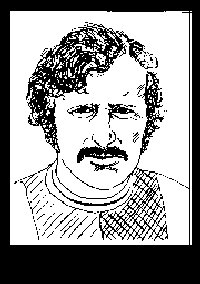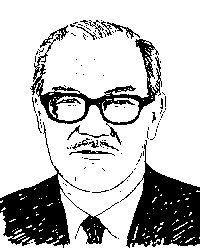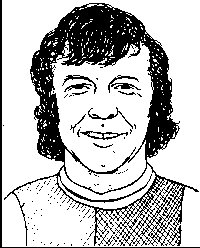1972-73
Before the season began there was no end of transfer speculation in the press, although most of it was due to Palace having earned a reputation for throwing money around, and therefore being 
| Alan Pinkney
|
linked with every player going. There was no doubt, however, that a new centre forward was a priority, considering that the top scorer the previous season had been the ageing Bobby Tambling, with just 11 goals in all competitions. Of the other forwards, John Craven had done best with eight goals, but Queen and Wallace were clearly below par. Bert Head claimed that during the summer he had been pursuing a total of 22 players, and among those he was apparently on the verge of signing were Stan Bowles, Alan Gowling and Derek Johnson, as well as England regular Alan Mullery. Nevertheless, come the kick off, the only significant changes to the side were the inclusion of Alan Pinkney in place of Sammy Goodwin in midfield, and Ross Jenkins replacing Gerry Queen. The playing strip had been made even worse with the addition of a white stripe down the middle, and a new badge in a supposedly high-tech design.
The league, determined to further pursue the war on foul play announced a new penalty points system, which at least had the merit of bringing some consistency to what had seemed fairly arbitrary refereeing the year before. Something I have yet to see anyone booked for is the offence, carrying one penalty point, of "A player using the shoulders of his own team colleague to assist in the heading of the ball", so this practice at least must have been successfully stamped out.
Palace's start this time was not disastrous, although suggestive of yet another season spent in the bottom half of the table. With four draws and a defeat in the first five games, again the problem looked to be one of scoring goals, but perhaps the most worrying incident was the broken leg sustained by Peter Wall in the 1-1 draw against his old club, Liverpool. This was, in effect, the end of his season, and although he was loaned to Orient for rehabilitation once the break had mended, it was to be another two and a half years before he regained a regular place in the side.

| Charlie Cooke |
The left back position went at first to the 18 year old Bill Roffey, and then Tony Taylor was moved back from midfield to defence, fairly successfully. By now, just four years after promotion, the only five survivors from that team made up the entire defence; John Jackson, David Payne, Tony Taylor, John McCormick and Mel Blyth.
Following a single goal defeat of Manchester City, courtesy of an own goal and Jackson's penalty save from Francis Lee, came a 2-1 victory over Newcastle, and at the beginning of September Palace were sitting comfortably in 10th position, a significant improvement on the previous year. The Newcastle game featured a remarkable goal for Palace which, as it turned out, used up their quota of luck for the next two months. Willie Wallace lost control of the ball in the penalty area, but as he chased after it he stumbled into a defender, who could hardly believe it when the referee awarded a penalty. Although absolutely nobody agreed, the decision stood, and it was left to Palace's captain Bobby Kellard to take the spot kick. As he ran up, he slipped over and miskicked the ball completely with his left foot. This sent a clump of earth towards the goal, at the same time diverting the ball slowly into the net, with the goalkeeper McFaul utterly flummoxed.
The following Tuesday, a dire performance at home to Fourth Division Stockport County ended Palace's interest in the League Cup, and five straight league defeats sent them to the very bottom of the table. During this time, including two Texaco Cup games against Hearts, Palace went six games without scoring, and despite losing out to Manchester United for the signature of the £200,000 striker Ted MacDougall, Bert Head made it clear that he was about to make some big money signings.

| Paul Hammond |
The weeks that followed echoed the shake-up of the previous autumn, with Palace's transfer record broken twice; first by Iain Philip, a 21-year-old costing £115,000 from Dundee, and then Don Rogers, coming from Swindon for £150,000. Paddy Mulligan and Charlie Cooke also joined from Chelsea, and with John McCormick being dropped in favour of Bobby Bell, half the team was changed in a stroke. With Mulligan immediately installed as captain, a disgruntled Bobby Kellard demanded a transfer and was soon dropped, as were Wallace, Tambling and Jenkins.
Before the arrival of Rogers, Palace were unlucky to lose 3-2 to Arsenal in a home game, with all three Arsenal goals considered highly dubious,

| Ray Bloye |
and none more so than Charlie George's penalty. Paul Hammond, playing only his second game in goal in place of the injured Jackson, held on to the ball at the second attempt and seemed to have saved the penalty, but the referee considered that the ball had crossed the line, and Palace were denied a crucial point. Although the television evidence was inconclusive, it was one of those games where Palace certainly deserved a result which would have lifted them off the bottom of the First Division, but it was not until Don Rogers' arrival that there seemed any hope of a genuine revival. Rogers was already famous, having scored two goals for Swindon in the 1969 League Cup final against Arsenal, but the big clubs had remained unconvinced that he could step up in class, and consequently he had remained a star of the lower divisions until rejoining his old boss Bert Head at Palace. Any doubts about him were quickly dispelled in his first appearance, when he scored the goal against Everton which gave Palace only their third victory from 16 games. This goal was the first of many in exactly the same mould; racing onto a through ball from John Craven from his own half and beating the defender for speed before drawing the goalkeeper, looking up and placing the ball sweetly past him and into the net. Although he did score the odd scrambled goal, these solo efforts became his trademark, and as a crowd pleaser he was one of the best in the game. His heroic status was confirmed in the famous 5-0 defeat of Manchester United a few weeks later. This was the first game for another new signing, Alan Whittle from Everton, and he was to score a single goal alongside a brace each by Rogers and Paddy Mulligan. Arthur Wait described the losing team as "The worst United side I have ever seen", and it gave the board at Old Trafford the final excuse that they needed to get rid of their latest manager, Frank O'Farrell, and replace him with Tommy Docherty.
At last able to score goals, and augmented by the signing of Millwall's highest ever goalscorer, Derek Possee, Palace managed some good

| John Craven |
results which suggested the possibility of survival, but what the fans were unaware of at the time was that Bert Head's days were numbered. Ray Bloye, a front man for the business consortium Matthews Holdings, had been installed earlier in the season as vice-chairman, and despite his unconvincing protestations that "when I joined the club as a Director, I had neither the ambition nor the intention to become Chairman", by November the old Chairman Arthur Wait had become 'Life President', and Bloye's firm were firmly in control. It was not until the following March that it was announced that Bert Head was to be kicked upstairs, becoming General Manager until the end of the season, but it had been planned for some time. At this stage Palace were still one place away from relegation, and it seems remarkable that Head wasn't allowed to see out the last few weeks of the season in charge, but Bloye clearly felt that he could buy instant success, and so Malcolm Allison arrived, heralded as the saviour of Crystal Palace.
In a touching show of loyalty, Bert Head and his assistant Terry Long introduced Allison to the crowd before the home game against Chelsea, and for an afternoon at least Palace could hail the new Messiah. The 2-0 victory over Chelsea was Palace's first against a London club in all their time in the First Division, and Jim Cannon had an outstanding debut in defence, marking Peter Osgood out of the game, and rushing upfield to head in the second goal. However, Palace were unable to win again until the last game of the season at Manchester City, and despite achieving a better points total than in either 1971 or 1972, relegation finally became reality after four seasons of almost constant struggle.
Contents
Back to 1971-72
Forward to 1973-74




